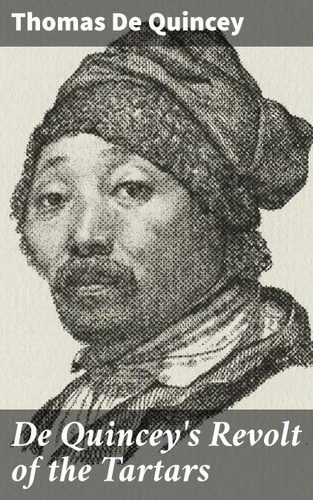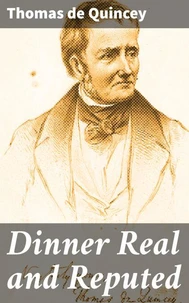De Quincey's Revolt of the Tartars. Unveiling the Turmoil: A Historical Journey through De Quincey's Revolt of Power and Chaos
Par : ,Formats :
Disponible dans votre compte client Decitre ou Furet du Nord dès validation de votre commande. Le format ePub est :
- Compatible avec une lecture sur My Vivlio (smartphone, tablette, ordinateur)
- Compatible avec une lecture sur liseuses Vivlio
- Pour les liseuses autres que Vivlio, vous devez utiliser le logiciel Adobe Digital Edition. Non compatible avec la lecture sur les liseuses Kindle, Remarkable et Sony
 , qui est-ce ?
, qui est-ce ?Notre partenaire de plateforme de lecture numérique où vous retrouverez l'ensemble de vos ebooks gratuitement
Pour en savoir plus sur nos ebooks, consultez notre aide en ligne ici
- Nombre de pages316
- FormatePub
- ISBN4057664614841
- EAN4057664614841
- Date de parution29/11/2019
- Protection num.Digital Watermarking
- Taille769 Ko
- Infos supplémentairesepub
- ÉditeurGOOD PRESS
Résumé
In "De Quincey'Äôs Revolt of the Tartars, " Thomas De Quincey presents a vivid narrative that interweaves historical events with romanticized interpretations of the Tartar Uprisings against Russian rule. Written in his distinctive prose, rich with opulent vocabulary and a complex, associative style, De Quincey transforms a historical account into a deeply psychological exploration of rebellion and identity.
The book serves as both a work of history and a meditation on the implications of colonialism and resistance, contextualizing the Tartars'Äô plight within the broader scope of European political dynamics of the 19th century. Thomas De Quincey, best known for his earlier work 'ÄúConfessions of an English Opium-Eater, 'Äù was a prominent figure in the Romantic literary movement, often drawing upon his own experiences with addiction and emotional turmoil to inspire his writings.
His fascination with the exotic and the sublime, combined with his keen interest in sociopolitical issues, profoundly influenced his portrayal of the Tartars. De Quincey'Äôs background in classical education and his philosophical inclinations further elucidate the intricate layers within this work. "De Quincey'Äôs Revolt of the Tartars" is an essential read for those interested in the intersections of literature and history, as it not only recounts a significant uprising but invites readers to contemplate the broader themes of oppression and freedom.
Scholars and general readers alike will find in De Quincey'Äôs eloquent style and profound insights a compelling addition to the discourse on nationalism and resistance.
The book serves as both a work of history and a meditation on the implications of colonialism and resistance, contextualizing the Tartars'Äô plight within the broader scope of European political dynamics of the 19th century. Thomas De Quincey, best known for his earlier work 'ÄúConfessions of an English Opium-Eater, 'Äù was a prominent figure in the Romantic literary movement, often drawing upon his own experiences with addiction and emotional turmoil to inspire his writings.
His fascination with the exotic and the sublime, combined with his keen interest in sociopolitical issues, profoundly influenced his portrayal of the Tartars. De Quincey'Äôs background in classical education and his philosophical inclinations further elucidate the intricate layers within this work. "De Quincey'Äôs Revolt of the Tartars" is an essential read for those interested in the intersections of literature and history, as it not only recounts a significant uprising but invites readers to contemplate the broader themes of oppression and freedom.
Scholars and general readers alike will find in De Quincey'Äôs eloquent style and profound insights a compelling addition to the discourse on nationalism and resistance.
In "De Quincey'Äôs Revolt of the Tartars, " Thomas De Quincey presents a vivid narrative that interweaves historical events with romanticized interpretations of the Tartar Uprisings against Russian rule. Written in his distinctive prose, rich with opulent vocabulary and a complex, associative style, De Quincey transforms a historical account into a deeply psychological exploration of rebellion and identity.
The book serves as both a work of history and a meditation on the implications of colonialism and resistance, contextualizing the Tartars'Äô plight within the broader scope of European political dynamics of the 19th century. Thomas De Quincey, best known for his earlier work 'ÄúConfessions of an English Opium-Eater, 'Äù was a prominent figure in the Romantic literary movement, often drawing upon his own experiences with addiction and emotional turmoil to inspire his writings.
His fascination with the exotic and the sublime, combined with his keen interest in sociopolitical issues, profoundly influenced his portrayal of the Tartars. De Quincey'Äôs background in classical education and his philosophical inclinations further elucidate the intricate layers within this work. "De Quincey'Äôs Revolt of the Tartars" is an essential read for those interested in the intersections of literature and history, as it not only recounts a significant uprising but invites readers to contemplate the broader themes of oppression and freedom.
Scholars and general readers alike will find in De Quincey'Äôs eloquent style and profound insights a compelling addition to the discourse on nationalism and resistance.
The book serves as both a work of history and a meditation on the implications of colonialism and resistance, contextualizing the Tartars'Äô plight within the broader scope of European political dynamics of the 19th century. Thomas De Quincey, best known for his earlier work 'ÄúConfessions of an English Opium-Eater, 'Äù was a prominent figure in the Romantic literary movement, often drawing upon his own experiences with addiction and emotional turmoil to inspire his writings.
His fascination with the exotic and the sublime, combined with his keen interest in sociopolitical issues, profoundly influenced his portrayal of the Tartars. De Quincey'Äôs background in classical education and his philosophical inclinations further elucidate the intricate layers within this work. "De Quincey'Äôs Revolt of the Tartars" is an essential read for those interested in the intersections of literature and history, as it not only recounts a significant uprising but invites readers to contemplate the broader themes of oppression and freedom.
Scholars and general readers alike will find in De Quincey'Äôs eloquent style and profound insights a compelling addition to the discourse on nationalism and resistance.
















